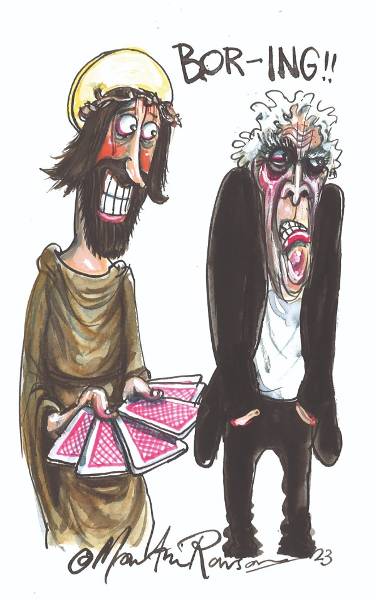Just as confidence in the global financial system plummets the confidence of the faithless is zooming in the opposite direction. At the end of October an advertising campaign was launched. The idea was to fund posters on London buses with the message “There is probably no God. Now stop worrying and enjoy your life”. It aimed to raise £5,500, hit its target within hours, and after a week it had topped £100,000 and is still rising. Significantly, these have been mainly small donations from individuals, more than 5,000 so far. In this issue's diary Ariane Sherine, who devised the campaign, explains what inspired it and recounts the sleepless nights and whirl of media attention precipitated by this huge, and entirely unexpected, surge of godless generosity.
Meanwhile, our own modest contribution to heathen happiness comes in the form of Nine Lessons and Carols for Godless People. This was originally conceived, by comedian Robin Ince, as a one-off benefit gig for the Rationalist Association and Mustard Seed, the secular Ugandan school we support. But the first gig at the Bloomsbury Theatre sold out within days, three months before the show was due to take place. We added another night, which sold out even more quickly. So a third night has now been arranged for 21 December – at the much bigger Hammersmith Apollo – with a few special guests added to the bill. This looks likely to sell out soon so hurry if you’d like tickets to see Robin, Ricky Gervais, Josie Long, Stewart Lee, Dara O’Briain, Richard Dawkins and the 20-piece Mystery Fax Machine Orchestra.
Whether or not you are able to make the London shows, make sure you keep visiting our website to hear podcasts featuring the performers. We’re also planning to make the Nine Lessons show available to all our readers in the New Year.
Both the bus campaign and Nine Lessons demonstrate that there are tens of thousands willing to put their money where their belief isn’t, and back rationalism and humanism. No wonder the ITV local news, in their hysterical coverage of the bus campaign, announced that “the atheist revolution has begun”.
But, though we may be feeling a bit giddy, we’re certainly not ignoring grimmer realities. In this issue sociologist Steven Lukes turns to Emile Durkheim’s classic study Suicide for advice on how to head off the anomie likely to accompany a prolonged recession, while Conor Gearty injects much-needed vigour into the debate around the Universal Declaration of Human Rights – 60 years old in December – by calling for a recommitment to those on the lowest rungs of global society.
We also visit two countries going through painful transitions. From Havana, Roger Davidson reports on a country struggling to free itself from an atheist revolution of an older vintage, while Kerem Oktem finds Turkey caught between two domestic forms of authoritarianism, one religious and one, at least putatively, secular. Similarly squeezed between warring camps is the late literary critic Edward Said, who, 30 years after the publication of his controversial book Orientalism, has recently come under attack for everything from trading in postmodern relativism to supporting Islamic terrorism. Stephen Howe orients a rational path through the thicket of invective.

